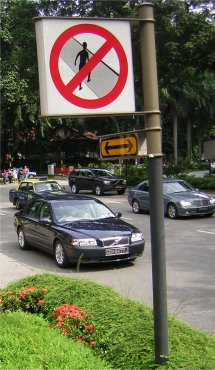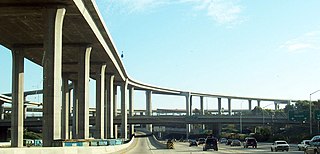
A self-driving car, also known as an autonomous car (AC), driverless car, or robotic car (robo-car), is a car that is capable of traveling without human input. Self-driving cars are responsible for perceiving the environment, monitoring important systems, and control, including navigation. Perception accepts visual and audio data from outside and inside the car and interpret the input to abstractly render the vehicle and its surroundings. The control system then takes actions to move the vehicle, considering the route, road conditions, traffic controls, and obstacles.

Jaywalking is the act of pedestrians walking in or crossing a roadway if that act contravenes traffic regulations. The term originated in the United States as a derivation of the phrase jay-drivers, people who drove horse-drawn carriages and automobiles on the wrong side of the road, before taking its current meaning. Jaywalking was coined as the automobile arrived in the street in the context of the conflict between pedestrian and automobiles, more specifically the nascent automobile industry.
Aptiv PLC is an Irish-American automotive technology supplier with headquarters in Dublin. Aptiv grew out of the now-defunct American company, Delphi Automotive Systems, which itself was formerly a component of General Motors.

Vehicular automation involves the use of mechatronics, artificial intelligence, and multi-agent systems to assist the operator of a vehicle such as a car, lorries, aircraft, or watercraft. A vehicle using automation for tasks such as navigation to ease but not replace human control, qualify as semi-autonomous, whereas a fully self-operated vehicle is termed autonomous.

A traffic collision, also known as a motor vehicle collision, occurs when a vehicle collides with another vehicle, pedestrian, animal, road debris, or other moving or stationary obstruction, such as a tree, pole or building. Traffic collisions often result in injury, disability, death, and property damage as well as financial costs to both society and the individuals involved. Road transport is the most dangerous situation people deal with on a daily basis, but casualty figures from such incidents attract less media attention than other, less frequent types of tragedy. The commonly used term car accident is increasingly falling out of favor with many government departments and organizations, with the Associated Press style guide recommending caution before using the term. Some collisions are intentional vehicle-ramming attacks, staged crashes, vehicular homicide or vehicular suicide.

Waymo LLC, formerly known as the Google Self-Driving Car Project, is an American autonomous driving technology company headquartered in Mountain View, California. It is a subsidiary of Alphabet Inc, the parent company of Google.

An automotive city or auto city is a city that facilitates and encourages the movement of people via private transportation, through 'physical planning', e.g., built environment innovations and 'soft programming' e.g., social policy surrounding city street usage.

Mobileye Global Inc. is a Delaware domiciled multinational company developing autonomous driving technologies and advanced driver-assistance systems (ADAS) including cameras, computer chips and software. Mobileye was acquired by Intel in 2017 and went public again in 2022.However it remains majority owned by Intel and incorporated in Delaware Mobileye is based in Jerusalem, Israel, and also has sales and marketing offices in Midtown, Manhattan, US; Shanghai, China; Tokyo, Japan; and Düsseldorf, Germany.

Experiments have been conducted on self-driving cars since 1939; promising trials took place in the 1950s and work has proceeded since then. The first self-sufficient and truly autonomous cars appeared in the 1980s, with Carnegie Mellon University's Navlab and ALV projects in 1984 and Mercedes-Benz and Bundeswehr University Munich's Eureka Prometheus Project in 1987. Since then, numerous major companies and research organizations have developed working autonomous vehicles including Mercedes-Benz, General Motors, Continental Automotive Systems, Autoliv Inc., Bosch, Nissan, Toyota, Audi, Volvo, Vislab from University of Parma, Oxford University and Google. In July 2013, Vislab demonstrated BRAiVE, a vehicle that moved autonomously on a mixed traffic route open to public traffic.
The Apple electric car project is an electric car project undergoing research and development by Apple Inc. Apple has yet to openly discuss any of its self-driving research, but around 5,000 employees were reported to be working on the project as of 2018. In May 2018, Apple reportedly partnered with Volkswagen to produce an autonomous employee shuttle van based on the T6 Transporter commercial vehicle platform. In August 2018, the BBC reported that Apple had 66 road-registered driverless cars, with 111 drivers registered to operate those cars. In 2020, it is believed that Apple is still working on self-driving related hardware, software and service as a potential product, instead of actual Apple-branded cars. In December 2020, Reuters reported that Apple was planning on a possible launch date of 2024, but analyst Ming-Chi Kuo claimed it would not be launched before 2025 and might not be launched until 2028 or later.
A robotaxi, also known as robo-taxi, self-driving taxi or driverless taxi, is an autonomous car operated for a ridesharing company.

Anthony Levandowski is a French-American self-driving car engineer. In 2009, Levandowski co-founded Google's self-driving car program, now known as Waymo, and was a technical lead until 2016. In 2016, he co-founded and sold Otto, an autonomous trucking company, to Uber Technologies. In 2018, he co-founded the autonomous trucking company Pronto; the first self-driving technology company to complete a cross-country drive in an autonomous vehicle in October 2018. At the 2019 AV Summit hosted by The Information, Levandowski remarked that a fundamental breakthrough in artificial intelligence is needed to move autonomous vehicle technology forward.

Argo AI was an autonomous driving technology company headquartered in Pittsburgh, Pennsylvania. The company was co-founded in 2016 by Bryan Salesky and Peter Rander, veterans of the Google and Uber automated driving programs. Argo AI was an independent company that built software, hardware, maps, and cloud-support infrastructure to power self-driving vehicles. Argo was mostly backed by Ford Motor Co. (2017) and the Volkswagen Group (2020).
Autonomous things, abbreviated AuT, or the Internet of autonomous things, abbreviated as IoAT, is an emerging term for the technological developments that are expected to bring computers into the physical environment as autonomous entities without human direction, freely moving and interacting with humans and other objects.
Cruise LLC is an American self-driving car company headquartered in San Francisco, California. Founded in 2013 by Kyle Vogt and Dan Kan, Cruise tests and develops autonomous car technology. The company is a largely autonomous subsidiary of General Motors.

A self-driving truck, also known as an autonomous truck or robo-truck, is an application of self-driving technology aiming to create trucks that can operate without human input. Alongside light, medium, and heavy-duty trucks, many companies are developing self-driving technology in semi trucks to automate highway driving in the delivery process.

Zoox, Inc. is a subsidiary of Amazon developing autonomous vehicles that provide mobility as a service. It is headquartered in Foster City, California and has offices of operations in the San Francisco Bay Area and Seattle, Washington. Zoox sits in the Amazon Devices & Services organization alongside other Amazon units like Amazon Lab126, Amazon Alexa, and Kuiper Systems.

Yandex self-driving car is an autonomous car project of the Russian-based technology company Yandex. The first driverless prototype launched in May 2017. As of 2018, functional service was launched in Russia with prototypes also being tested in Israel and the United States. In 2019, Yandex revealed autonomous delivery robots based on the same technology stack as the company's self-driving cars. Since 2020, autonomous robots have been delivering food, groceries and parcels in Russia and the United States. In 2020, the self-driving project was spun-off into a standalone company under the name of Yandex Self-Driving Group.
DeepMap, is a Palo Alto, California-based software company that develops high definition (HD) maps for self-driving vehicles.
Regulation of self-driving cars, autonomous vehicles and automated driving system is an increasingly relevant topic in the automotive industry strongly related to the success of the actual technology. Multiple countries have passed local legislation and agreed on standards for the introduction of autonomous cars.












